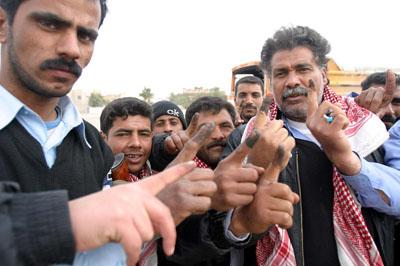 The Obama administration may finally get some good news. Iraq’s recent elections for parliament might actually result in a non-sectarian, pro-American government. This outcome would enable the Obama administration to fulfill its goal of removing all but 50,000 support troops by this August and drawn U.S. forces down to zero by the end of 2011.
The Obama administration may finally get some good news. Iraq’s recent elections for parliament might actually result in a non-sectarian, pro-American government. This outcome would enable the Obama administration to fulfill its goal of removing all but 50,000 support troops by this August and drawn U.S. forces down to zero by the end of 2011.
The resilient and courageous Iraqi people voted in higher percentages than the American electorate, with 62 percent of eligible voters going to the polls. This voter participation is a positive step toward a free, sovereign, and democratic Iraq. The future, however, will depend on the actions and attitudes of Iraqis, Americans and Iraq’s neighbors.
A New Parliament
The preliminary results for the 325 seats in parliament indicate that Ayad Allawi’s Iraqia Party has garnered 91 seats, while incumbent Prime Minister Nouri al-Maliki’s State of Law Party won 89 seats. The Kurds have perhaps lost the most from this election. The main Kurdish Alliance won 43 seats and thus have fewer seats than before. The new secular group, Goran (meaning “change”), has split the Kurdish alliance. Goran could play an important role in joining any secular coalition.
Before the election, the Justice and Accountability Commission (co-chaired by Ahmed Chalabi, a candidate for parliament in this election) barred over 100 candidates from running. Of these, 55 were from Allawi’s list, and he has protested vociferously. Yet, while both sides are claiming foul, UN senior envoy Ad Melkert contends that the irregularities in the Iraqi election aren’t widespread and won’t affect the overall outcome.
The threat of violence remains real in Iraq. Nearly 100,000 foreign troops and at least that many contractors currently occupy Iraq. Most democratic institutions are weak or nonexistent; sectarian security forces continue to exist. Iraq functions under a sectarian constitution imposed by the Americans early in the invasion. And yet there is room for hope in this election.
Iraqi voters, way ahead of their politicians, rejected both sectarianism and dividing Iraq under the guise of federalism. In this regard the religious parties, especially those with close ties to Iran, were the biggest losers. (One exception was the vote strength of Muqtada al-Sadr’s Shiite Muslim movement, because of its anti-occupation and nationalistic message.) Maliki changed his previous stance, splitting from the religious coalitions to form a non-sectarian party, the State of Law Coalition. This time around, he aimed to appeal to the Iraqis’ abhorrence to sectarian violence. However, Maliki reserved his cordial relations with religious groups in case he needed them after the election.
U.S. Interference
Ambassador Christopher Hill and General Ray Odierno clearly interfered in the election in promoting pro-American candidates Maliki and Allawi. This effort achieved its goal, since the two groups will now control the government. But despite the interference from U.S. officials, Iraqis have made progress toward sovereignty and democracy, which can potentially become even stronger after the withdrawal of American troops. The removal of the anti-occupation card will erode support for al-Sadr and strengthen the messages of secular parties.
Allawi will be given the first chance to form the government. Together, the parties of Maliki and Allawi can form a stable and functional Iraqi government. This coalition will please the Americans. However, their personal animosity is a strong obstacle to forming such an alliance. Further complicating this coalition-building, the party of Al-Sadr won’t join Maliki, since he attacked and disarmed them in Basra at the behest of the Americans. Maliki’s party can form a coalition with smaller religious groups, but the resulting government will be weak. Moreover, Allawi and other non-sectarian groups would continue to undermine his authority. Both the weakened Kurdish Alliance and Goran will be the wild cards in this game of coalition-building.
The participation of Iraqis in their election and the enforcement of election laws by Iraq’s Independent High Election Commission are but two examples of small steps toward democracy. If a stable and functional government is formed, the Iraqi people will have another opportunity to sustain and cement their democracy. Central to this process will be the strengthening of civil society. Civil society is not new to Iraq. Hammurabi’s Code, the first written laws in human history, was instituted in Iraq nearly 3,700 years ago. Iraqi attempts to build a modern civil society must overcome the triple challenges of history, current sectarian strife, and ongoing American intervention. Respecting the Iraqis to go through their own process of democratic trial and error is all part of restoring the rule of law to the land of Hammurabi.